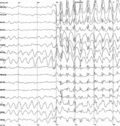Status epilepticus: Difference between revisions
CSV import Tag: Replaced |
CSV import Tags: mobile edit mobile web edit |
||
| Line 37: | Line 37: | ||
* Shorvon, S. (2001). ''Status Epilepticus: Its Clinical Features and Treatment in Children and Adults''. Cambridge University Press. ISBN 978-0-521-58117-0. | * Shorvon, S. (2001). ''Status Epilepticus: Its Clinical Features and Treatment in Children and Adults''. Cambridge University Press. ISBN 978-0-521-58117-0. | ||
* Trinka, E., & Höfler, J. (2015). ''Status epilepticus: A critical review''. Epilepsy & Behavior, 49, 86-91. doi:10.1016/j.yebeh.2015.04.044. | * Trinka, E., & Höfler, J. (2015). ''Status epilepticus: A critical review''. Epilepsy & Behavior, 49, 86-91. doi:10.1016/j.yebeh.2015.04.044. | ||
<gallery> | |||
File:Spike-waves.png | |||
File:Rectalvalium.jpg | |||
</gallery> | |||
Revision as of 02:09, 17 February 2025
Status epilepticus is a type of epilepsy that is characterized by continuous or recurrent seizures. It is a medical emergency that requires immediate treatment.
Definition
Status epilepticus is defined as a seizure that lasts for more than five minutes, or two or more seizures within a five-minute period without the person returning to normal between them.
Causes
The causes of status epilepticus can be divided into two categories: known and unknown. Known causes include stroke, trauma, infection, and metabolic disorders. Unknown causes are those where no specific cause can be identified.
Symptoms
The symptoms of status epilepticus can vary depending on the type of seizure. They can include convulsions, loss of consciousness, and abnormal behavior.
Treatment
The treatment of status epilepticus involves stopping the seizure as quickly as possible and treating the underlying cause. This can involve the use of antiepileptic drugs, sedatives, and other treatments.
Prognosis
The prognosis for status epilepticus can vary depending on the underlying cause and the person's overall health. In some cases, it can be life-threatening.
See also
|
|
|
References
<references />
External links
Further reading
- Shorvon, S. (2001). Status Epilepticus: Its Clinical Features and Treatment in Children and Adults. Cambridge University Press. ISBN 978-0-521-58117-0.
- Trinka, E., & Höfler, J. (2015). Status epilepticus: A critical review. Epilepsy & Behavior, 49, 86-91. doi:10.1016/j.yebeh.2015.04.044.




